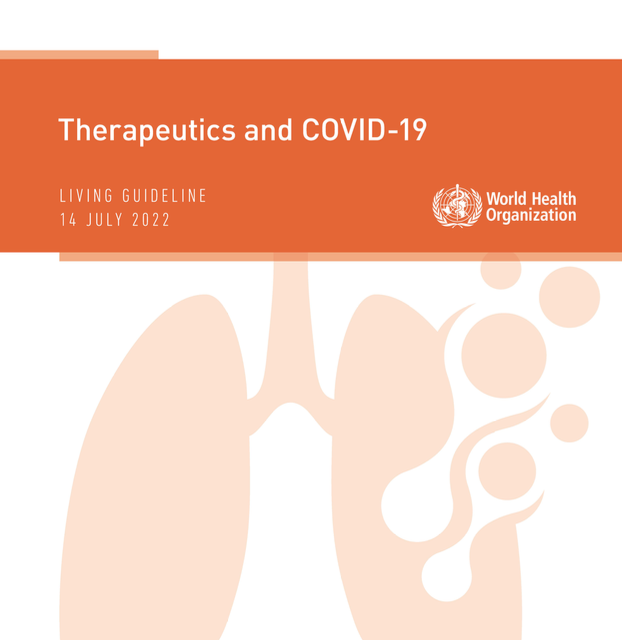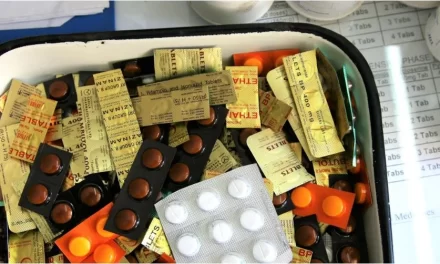The WHO Therapeutics and COVID-19: living guideline contains the Organization’s most up-to-date recommendations for the use of therapeutics in the treatment of COVID-19. The latest version of this living guideline is available in pdf format (via the ‘Download’ button) and via an online platform, and is updated regularly as new evidence emerges.
This tenth version of the WHO living guideline now contains 19 recommendations, including two new recommendations regarding fluvoxamine and colchicine. No further updates to the previous existing recommendations were made in this latest version.
The WHO Therapeutics and COVID-19: living guideline currently includes a:
- ** NEW ** recommendation not to use fluvoxamine in patients with non-severe COVID-19 except in the context of a clinical trial (published 14 July 2022);
- ** NEW ** strong recommendation against the use of colchicine in patients with non-severe COVID-19 (published 14 July 2022);
- strong recommendation for the use of nirmatrelvir-ritonavir in patients with non-severe illness at the highest risk of hospitalization (published 22 April 2022);
- conditional recommendation against the use of nirmatrelvir-ritonavir in patients with non-severe illness at a low risk of hospitalization (published 22 April 2022);
- conditional recommendation for the use of remdesivir in patients with non-severe COVID-19 at the highest risk of hospitalization (first published 20 November 2020, updated 22 April 2022);
- conditional recommendation for the use of molnupiravir in patients with non-severe COVID-19, at highest risk of hospitalization (excluding pregnant or breastfeeding women, and children) (published 03 March 2022);
- conditional recommendation for the use of a combination of neutralizing monoclonal antibodies (casirivimab and imdevimab) in patients with non-severe COVID-19, at the highest risk of severe disease, where viral genotyping can confirm a susceptible SARS-CoV-2 variant (i.e. excluding Omicron BA.1) (first published 24 September 2021; updated 03 March 2022);
- conditional recommendation for the use of a combination of neutralizing monoclonal antibodies (casirivimab and imdevimab) in severe and critically ill COVID-19 patients with seronegative status, where viral genotyping can confirm a susceptible SARS-CoV-2 variant (i.e. excluding Omicron BA.1) (first published 24 September 2021; updated 03 March 2022);
- strong recommendation for the use of baricitinib as an alternative to interleukin-6 (IL-6) receptor blockers, in combination with corticosteroids, in patients with severe or critical COVID-19 (published 14 January 2022);
- conditional recommendation against the use of ruxolitinib and tofacitinib in patients with severe or critical COVID-19 (published 14 January 2022);
- conditional recommendation for the use of sotrovimab in patients with non-severe COVID-19, conditional for those at highest risk of hospitalization (published 14 January 2022);
- strong recommendation against the use of convalescent plasma in patients with non-severe COVID-19 (published 7 December 2021);
- recommendation not to use convalescent plasma in patients with severe or critical COVID-19 except in the context of a clinical trial (published 7 December 2021);
- strong recommendation to use IL-6 receptor blockers (tocilizumab or sarilumab) in patients with severe or critical COVID-19 (published 6 July 2021);
- recommendation not to use ivermectin in patients with COVID-19 except in the context of a clinical trial (published 31 March 2021);
- strong recommendation against the use of hydroxychloroquine in patients with COVID-19 of any severity (published 17 December 2020);
- strong recommendation against the use of lopinavir/ritonavir in patients with COVID-19 of any severity (published 17 December 2020);
- strong recommendation to use systemic corticosteroids in patients with severe and critical COVID-19 (published 2 September 2020);
- conditional recommendation against the use of systemic corticosteroids in patients with non-severe COVID-19 (published 2 September 2020).
Other COVID-19 therapeutics that are currently under consideration by WHO include fluvoxamine, colchicine and anticoagulants. This guideline will be updated if/when sufficient new evidence warrants this.
Guidelines regarding the use of drugs to prevent (rather than treat) COVID-19 are included in a separate document, WHO Living guideline: Drugs to prevent COVID-19, that can be accessed via an online platform and in pdf format (or click ‘PDF’ in top right corner of online platform).
Guidelines regarding the clinical management of COVID-19 patients are included in a further document, COVID-19 Clinical management: Living guideline, that can be accessed via an online platform and in pdf format (or click ‘PDF’ in top right corner of online platform).
To view previous (now outdated) versions of this guideline, please see the links below:
- First version, published 2 September 2020 (accessible as pdf only)
- Second version, published 20 November 2020 (access as pdf or via online platform)
- Third version, published 17 December 2020 (access as pdf or via online platform)
- Fourth version, published 31 March 2021 (access as pdf or via online platform)
- Fifth version, published 6 July 2021 (access as pdf or via online platform)
- Sixth version, published 24 September 2021 (access as pdf or via online platform)
- Seventh version, published 7 December 2021 (access as pdf or via online platform)
- Eighth version, published 14 January 2022 (access as pdf or via online platform)
- Nineth version, published 3 March 2022 (access as pdf or via online platform)
- Tenth version, published 22 April 2022 (access as pdf or via online platform)
This document was updated on 14 July 2022











